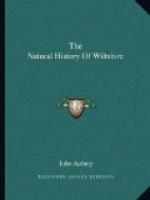It is certain that no county of England had greater
variety of game, &c. than Wiltshire, and our county
hounds were as good, or rather the best of England;
but within this last century the breed is much mix’t
with northern hounds. Sir Charles Snell, of Kington
St. Michael, who was my honoured friend and neighbour,
had till the civill warrs as good hounds for the hare
as any were in England, for handsomenesse and mouth
(deep-mouthed) and goodnesse, and suited one another
admirably well. But it was the Right Hon. Philip
I. Earle of Pembroke, that was the great hunter.
It was in his lordship’s time, sc. tempore Jacobi
I. and Caroli I. a serene calme of peace, that hunting
was at its greatest heighth that ever was in this
nation. The Roman governours had not, I thinke,
that leisure. The Saxons were never at quiet;
and the barons’ warres, and those of York and
Lancaster, took up the greatest part of the time since
the Conquest: so that the glory of the English
hunting breath’d its last with this Earle, who
deceased about 1644, and shortly after the forests
and parkes were sold and converted into arable, &c.
’Twas after his lordship’s decease [1650]
that I was a hunter; that is to say, with the Right
Honourable William, Lord Herbert, of Cardiff, the
aforesaid Philip’s grandson. Mr. Chr.
Wace then taught him Latin, and hunted with him; and
’twas then that he translated Gratii Cynegeticon,
and dedicated it to his lordship, which will be a
lasting monument for him. Sir Jo. Denham
was at Wilton at that time about a twelve moneth.
___________________________________
The Wiltshire greyhounds were also the best of England, and are still; and my father and I have had as good as any were in our times in Wiltshire. They are generally of a fallow colour, or black; but Mr. Button’s, of Shirburn in Glocestershire, are some white and some black. But Gratius, in his Cynegeticon, adviseth:-
“And
chuse the grayhound py’d with black and white,
He
runs more swift than thought, or winged flight;
But
courseth yet in view, not hunts in traile,
In
which the quick Petronians never faile.”
We also had in this county as good tumblers as anywhere in the nation. Martial speakes of the tumblers:-
“Non
sibi sed domino venatur vertagus acer,
Illæsum
leporem qui tibi dente feret” —
Turnebus, Young, Gerard, Vossius, and Janus Ulitius, all consenting that the name and dog came together from Gallia Belgica. Dr. Caldicot told me that in Wilton library there was a Latine poeme (a manuscript), wrote about Julius Caesar’s time, where was mention of tumblers, and that they were found no where but in Britaine. I ask’d him if ’twas not Gratius; he told me no. Quaere, Mr. Chr. Wace, if he remembers any such thing? The books are now most lost and gonne: perhaps ’twas Martial.
Very good horses for the coach are bought out of the
teemes in our hill-countrey. Warminster market
is much used upon this account.
___________________________________




